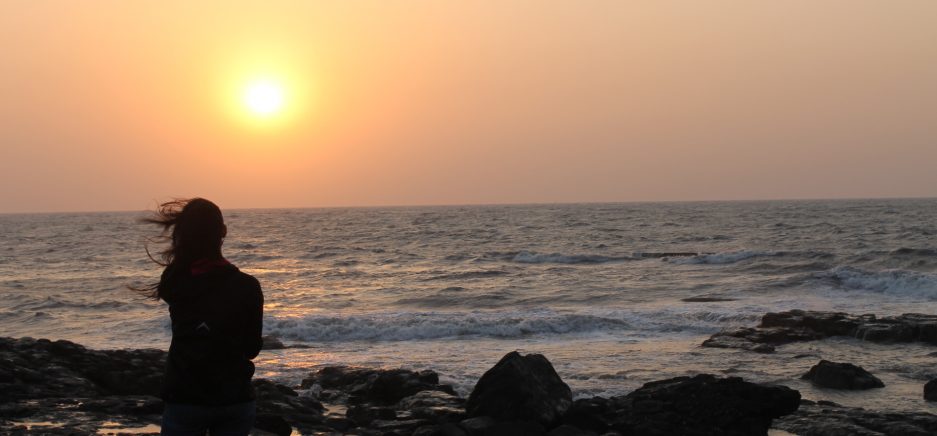Sometimes I have nothing to say or maybe too much to say but everything is so scattered so incoherent that nothing comes out on the paper. Yet I have promised myself that I will write every single day canceling the cacophony of the world around me. I try to dig within to find something to say here. In my country, the most common phrase after how are you is, How’s the weather? And then people do talk about the weather at a stretch, sharing trivial to the most recent upheavals. The most common being rains in the scorching heat of Indian summer. The arid desert winds getting calmly caressed by the tiny tip-tap of the raindrops. The petrichor brings people out of their air-conditioned rooms, forcing them to feel the gentle breeze. The thunder and lightning exciting young kids, who run out of their homes to enjoy the showers. You look around and everyone is standing or sitting in their balconies enjoying this beautiful change. There was a time in my life I used to feel very melancholic during the rain. I think the company has a huge impact on how you perceive things. Here at my home, I embrace the rains as they embrace me. I no longer indulge in nostalgia instead I enjoy the gentle breeze and let it sway me with the molecules of happiness. I look at the birds who are searching for hiding places. Then a pigeon dives and settles himself on my balcony’s sunshade. He then flutters his wings in an attempt to dry himself. And I wonder what an amazing technique, how much cloth we would save if we too like them, could flutter and dry ourselves. No need for fancy towels or changing apparel, just flutter and you are ready for the day or night. I wonder what led us all towards these inventions which have turned our life so complicated. Fashion in itself is an industry of trillion and from making it to selling to wearing it, you name it and you will find people indulged in the business of it.
And then voila, after all this jibber-jabber of nothing but weather, I finally feel I have something interesting to share with you.
A few months ago I read a French book called Ladies Paradise by famous French author Emile Zola. The book takes you back into the lanes of Paris of the mid 19th century and to the time where departmental stores begin their journey. In today’s world, it is hard to think of a market without giant Malls but there was a time when the world ran with small stores, it still does in developing nations but there too slowly the rampant development is paving way for the malls. So this novel comes alive where a man opens a store but his desire to be the richest and the most powerful giant in the world of fashion leads him to open the first department store. The protagonist Octave Mouret comes up with brilliant ideas of giant advertisement hoardings to no return policy to home deliveries and the world of fashion rapidly changes, leading to shutting down of smaller shops, eventually turning them bankrupt.
The story showcases how Paris, the capital of Fashion led us all to the present-day Fashion culture. Why was the department store created? Mouret taps on women’s desire to have more, so he places sections in a particular order. So that if a woman enters his store, she leaves without a penny in her purse. His giant appetite to eat up other men’s money through the females of their family makes men vary off him. And amongst this giant world of Fashion unfolds an unusual love story. Mouret who constantly talks about women as commodities and his desire to make them all his slaves is warned by other men that there will be one who will take the revenge of all. And then enters Denise Badu, an orphaned girl of nineteen from a provincial place with her two younger brothers. And things start shifting in Mouret’s world slowly.
Denise’s character is my absolute favorite, how she is first scorned in the department store for her background and her looks and how slowly with her sheer hard work and her ideas to run the business she turns into a department head. How unlike other girls she never let herself waver and how she kept supporting her younger brothers like a mother. How she is noticed by Mouret and how she resists his advances, refusing to become another notch on his belt; refusing, in essence, to be commodified.
The high points of the book are brilliant comparisons between the new Department store and the traditional ones. The showcasing of the demise of the independent trader by rampant consumerism. The mechanisms of seduction Mouret uses to transform everything for sale into an object of desire. The store leads women, driven by the euphoria of the sheer range of delights on offers and the bargains, into buying what they don’t need, spending far beyond their reach, and in the end resort to shoplifting. They lose their heads, even when they know they are out of control, they cannot stop.
But the weakest part of the book is its love story, where you will continually question the attraction between Mourat and Denise. Especially Denise’s feelings for Mouret. If like me you want to pick it up for the sheer adventure of discovering the footing of a department store and to see the Paris of mid-nineties, I would surely say go ahead.
Just a bit of warning, it’s a slow read but an interesting one.
On this note, I will end my chitter-chatter here. Rendez-vous demain, until then Au revoir.


